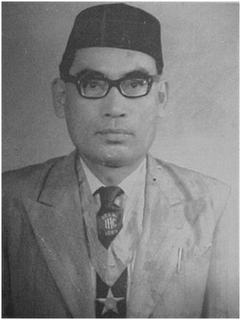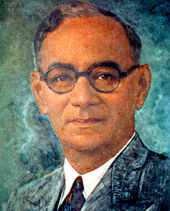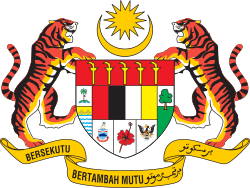Malaysian general election, 1964
Malaysian general election, 1964

|
|
|
|
104 (of the 159) seats to the Dewan Rakyat
and all 282 state legislature seats in 11 (out of 14, except Sabah, Sarawak and Singapore) states of Malaysia
53 seats needed for a majority |
| Turnout |
2,146,608 (78.9%) |
| |
First party |
Second party |
Third party |
| |
 |
 |
 |
| Leader |
Tunku Abdul Rahman |
Tan Chee Khoon |
Burhanuddin al-Helmy |
| Party |
Alliance |
Socialist Front |
PAS |
| Leader since |
23 August 1951 |
21 March 1964 |
1956 |
| Leader's seat |
Kuala Kedah |
Batu |
No seat |
| Last election |
74 seats, 51.8% |
8 seats, 12.9% |
13 seats, 21.3% |
| Seats won |
89 |
2 |
9 |
| Seat change |
 15 15 |
 6 6 |
 4 4 |
| Popular vote |
1,204,340 |
330,898 |
301,187 |
| Percentage |
58.5% |
16.1% |
14.6% |
| Swing |
 6.7% 6.7% |
 3.2% 3.2% |
 6.7% 6.7% |
|
| |
Fourth party |
Fifth party |
Sixth party |
| |
UDP |
PPP |
 |
| Leader |
Lim Chong Eu |
D. R. Seenivasagam |
Lee Kuan Yew |
| Party |
United Democratic Party |
People's Progressive Party |
PAP |
| Leader since |
1962 |
10 April 1953 |
21 November 1954 |
| Leader's seat |
Tanjong |
Ipoh |
No seat |
| Last election |
New Party |
4 seats, 6.3% |
New Party |
| Seats won |
1 |
2 |
1 |
| Seat change |
|
 2 2 |
|
| Popular vote |
88,223 |
69,898 |
42,130 |
| Percentage |
4.3% |
3.4% |
2.0% |
|
| |
Seventh party |
|
|
| |
 |
|
|
| Leader |
Onn Jaafar |
|
|
| Party |
National Party |
|
|
| Leader since |
10 May 1946 |
|
|
| Leader's seat |
No seat |
|
|
| Last election |
1 seat, 2.1% |
|
|
| Seats won |
No seats |
|
|
| Seat change |
 1 1 |
|
|
| Popular vote |
7,319 |
|
|
| Percentage |
0.4% |
|
|
| Swing |
 1.7% 1.7% |
|
|
|
|
General elections were held in West Malaysia on 25 April 1964.[1] The result was a victory for the Alliance Party, which won 89 of the 104 seats. Voter turnout was 78.9%.
The result also contributed towards the eventual expulsion of Singapore from Malaysia. The Singaporean-based People's Action Party decided to run on the mainland, and although it attracted large crowds at its rallies, it won only one seat — that by Devan Nair, who represented the Bungsar constituency (now part of Seputeh and Lembah Pantai constituencies). It is thought by some historians that Finance Minister and MCA President Tan Siew Sin's appeal to the Chinese to avoid challenging the Malay special rights and risk merger with Indonesia helped the MCA retain its status as the "undisputed leader of the Chinese in the Malayan peninsula". Nevertheless, UMNO leaders were furious with the PAP.
Although it was the first parliamentary general election held after the formation of Malaysia in 1963, the election was not held in Singapore, Sabah and Sarawak. Transitional provisions allowed the state legislatures of the three states to choose their parliamentary representatives until the next election. The three states have been allocated a total of 55 seats in the Malaysian Parliament: 15 seats for Singapore, 16 seats for Sabah and 24 seats for Sarawak. Together, the three states held 34% out the 159 seats in the parliament. This was intended to act as a check to prevent parliament from passing constitutional amendments (which require a two-thirds majority) without the agreement of representatives from the three new states. After Singapore left Malaysia, Sabah and Sarawak were only left with 25% of the seats, as a consequence Sabah and Sarawak were not able to stop the parliament from approving laws that would encroach on the special rights granted to Sabah and Sarawak upon merger to form Malaysia.
Results
| Political Party |
Votes |
% of vote |
Seats |
% of seats |
+/– |
|---|
|
Alliance Party | Alliance | 1,204,340 | 58.5 | 89 | 85.6 | +15 |
| |
United Malays National Organisation | UMNO | | 38.1 | 59 | 56.7 | +7 |
| |
Malayan Chinese Association | MCA | | 18.7 | 27 | 26.0 | +8 |
| |
Malayan Indian Congress | MIC | | 1.6 | 3 | 2.9 | 0 |
|
Malayan Peoples' Socialist Front | SF | 330,898 | 16.1 | 2 | 1.9 | -6 |
|
Labour Party of Malaya | Lab | | | 2 | 1.9 | -4 |
|
Parti Ra'ayat | Ra'ayat | | | 0 | 0.0 | -2 |
|
Pan-Malaysian Islamic Party | PAS | 301,187 | 14.6 | 9 | 8.7 | -4 |
|
United Democratic Party | UDP | 88,223 | 4.3 | 1 | 1.0 | New |
|
People's Progressive Party | PPP | 69,898 | 3.4 | 2 | 1.9 | -2 |
|
People's Action Party | PAP | 42,130 | 2.0 | 1 | 1.0 | New |
|
National Party | Negara | 7,319 | 0.4 | 0 | 0.0 | -1 |
|
Independents | IND | 13,509 | 0.7 | 0 | 0.0 | -3 |
| Valid votes | 2,057,504 | |
| Invalid/blank votes | 89,104 |
| Total (turnout: 78.9%) | 2,146,608 | 100.0 | 104 | 100.0 | 0 |
| Did not vote | 535,287 | |
| Registered voters | 2,681,895 |
Source: Nohlen et al.
- Two Alliance candidates won uncontested.
|
References
- ↑ Nohlen, D, Grotz, F & Hartmann, C (2001) Elections in Asia: A data handbook, Volume II, p152 ISBN 0-19-924959-8
|
|---|
| | General elections | |
|---|
| | State elections | Nationwide
Election Results | |
|---|
| | |
|---|
| | |
|---|
| | |
|---|
|
|---|
| Parliamentary
by-elections |
- Kampar 1960
- Telok Anson 1961
- Kuala Trengganu Selatan 1962
- Lipis 1962
- Muar Selatan 1963
- Seberang Selatan 1964
- Bruas 1966
- Krian Laut 1966
- Kelantan Hilir 1967
- Pasir Mas Hulu 1967
- Raub 1967
- Segamat Utara 1969
- Lipis 1972
- Rembau-Tampin 1972
- Ulu Selangor 1972
- Johor Timor 1973
- Selayang 1975
- Kemaman 1976
- Pekan 1976
- Keningau 1977
- Kimanis 1977
- Panti 1977
- Pontian 1978
- Pelabuhan Kelang 1978
- Sri Gading 1981
- Seremban 1983
- Tampin 1983
- Padang Terap 1985
- Lubok Antu 1987
- Limbawang 1987
- Gopeng 1987
- Johor Bahru 1988
- Ampang Jaya 1989
- Bentong 1989
- Jerai 1991
- Gua Musang 1995
- Bagan 1995
- Lipis 1997
- Telok Intan 1997
- Kuala Selangor 1997
- Arau 1998
- Telok Kemang 2000
- Pendang 2002
- Gaya 2002
- Permatang Pauh 2008
- Kuala Terengganu 2009
- Bukit Gantang 2009
- Hulu Selangor 2010
- Sibu 2010
- Batu Sapi 2010
- Bukit Gelugor 2014
- Teluk Intan 2014
- Rompin 2015
- Permatang Pauh 2015
|
|---|
| State assemblies
by-elections | |
|---|
| Local government
elections |
- 1951
- 1952
- 1953
- 1954
- 1955
- 1956
- 1957
- 1958
- 1959
- 1960
- 1961
- 1962
- 1963
- 1964
- 1965
|
|---|
| |
|





